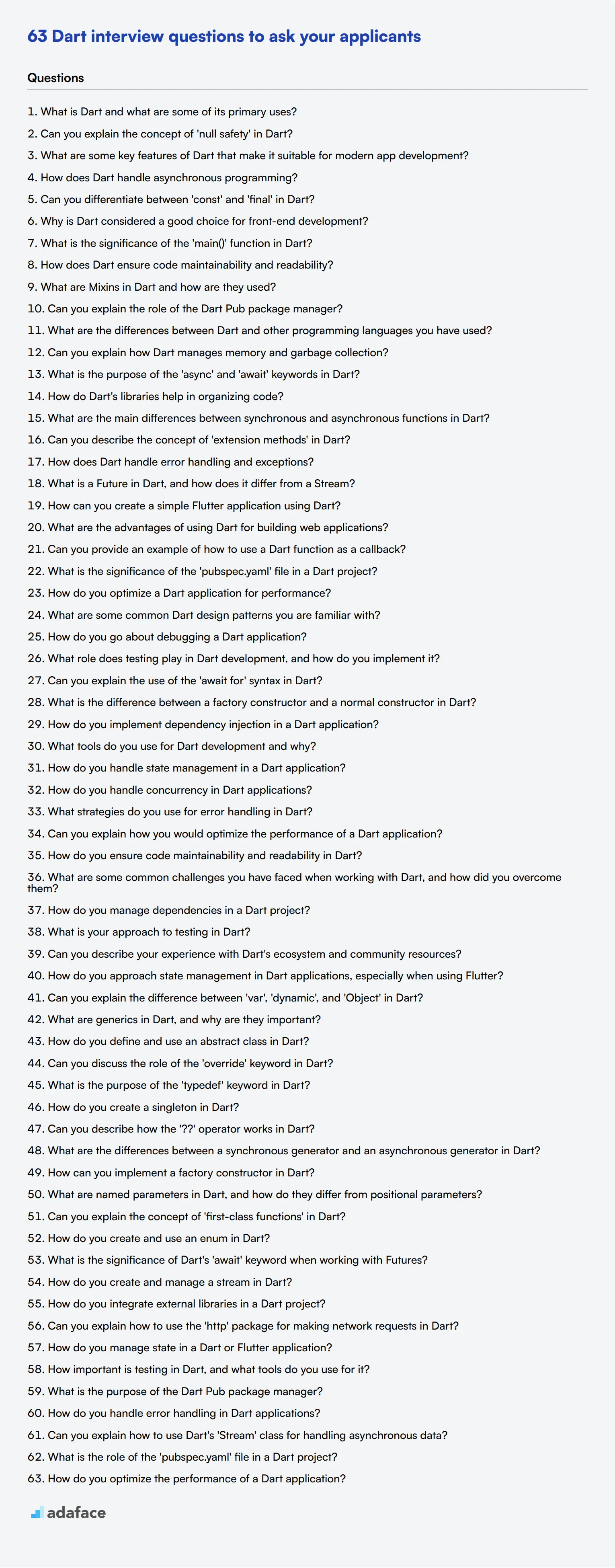Hiring the right Dart developers can be challenging without the proper interview questions. Effective questioning helps recruiters and hiring managers assess a candidate's programming skills and determine their suitability for the role.
This blog post provides a comprehensive list of Dart interview questions tailored for different experience levels. From basic concepts to advanced topics, we cover language syntax, semantics, framework usage, and libraries to help you evaluate candidates thoroughly.
By using these questions, you can gain insights into a candidate's Dart proficiency and make informed hiring decisions. Consider complementing your interviews with a Dart online test to get a more complete picture of candidates' abilities.
Table of contents
10 basic Dart interview questions and answers to assess candidates

To help you gauge whether candidates have a foundational understanding of Dart, we've compiled a list of 10 essential questions. These questions are designed to be straightforward, allowing you to quickly assess a candidate's basic knowledge without diving into overly technical details.
1. What is Dart and what are some of its primary uses?
Dart is a programming language developed by Google. It is optimized for building mobile, desktop, server, and web applications. One of its primary uses is in developing mobile apps using the Flutter framework.
Candidates should demonstrate an understanding of Dart's versatility and its association with Flutter. Look for mentions of performance, ease of use, and cross-platform capabilities.
2. Can you explain the concept of 'null safety' in Dart?
Null safety in Dart helps prevent errors that result from unintentional access to variables that are null. Dart's null safety feature ensures that values can't be null unless explicitly allowed.
A strong candidate should mention how null safety enhances code reliability and helps in catching potential null errors at compile-time rather than runtime.
3. What are some key features of Dart that make it suitable for modern app development?
Dart offers several features that make it suitable for modern app development, such as a rich standard library, strong typing, asynchronous programming, and the ability to compile to JavaScript.
Look for candidates who can articulate how these features contribute to efficiency, performance, and developer productivity.
4. How does Dart handle asynchronous programming?
Dart handles asynchronous programming using async and await keywords, along with Futures and Streams. These tools allow developers to write asynchronous code that is easy to read and maintain.
Ideal responses should highlight the practical benefits of async and await, such as improved readability and non-blocking operations.
5. Can you differentiate between 'const' and 'final' in Dart?
In Dart, 'final' is used to declare a variable that can be set only once. 'Const' is used for compile-time constants, meaning the value is determined at compile-time and cannot be changed.
Candidates should be able to explain scenarios where each would be used, emphasizing 'const' for compile-time constants and 'final' for run-time constants.
6. Why is Dart considered a good choice for front-end development?
Dart is considered a good choice for front-end development because it allows for fast compilation to JavaScript, making it suitable for web applications. Additionally, its strong type system and rich libraries enhance developer productivity.
Responses should include mentions of performance benefits, ease of learning, and the ability to target multiple platforms from a single codebase.
7. What is the significance of the 'main()' function in Dart?
The 'main()' function is the entry point of a Dart application. It is where the execution of a Dart program begins.
Candidates should be able to explain that any Dart program needs a 'main()' function and discuss its role in initializing and running the application.
8. How does Dart ensure code maintainability and readability?
Dart promotes code maintainability and readability through its strong type system, clear syntax, and support for object-oriented programming. Additionally, Dart's standard library and rich set of tools help maintain consistent code quality.
Ideal candidates should emphasize the importance of these features in long-term code management and team collaboration.
9. What are Mixins in Dart and how are they used?
Mixins in Dart are a way to reuse a class's code in multiple class hierarchies. They provide a means to add methods and properties to a class without using inheritance.
A good response should include practical examples of when and why to use mixins, highlighting their role in code reuse and flexibility.
10. Can you explain the role of the Dart Pub package manager?
Dart Pub is the package manager for Dart. It helps developers to manage dependencies, libraries, and tools for their Dart projects. Pub makes it easy to include external packages and share your own.
Look for candidates who can discuss the advantages of using Pub, such as simplifying dependency management and promoting code reuse through community packages.
21 Dart interview questions to ask junior developers
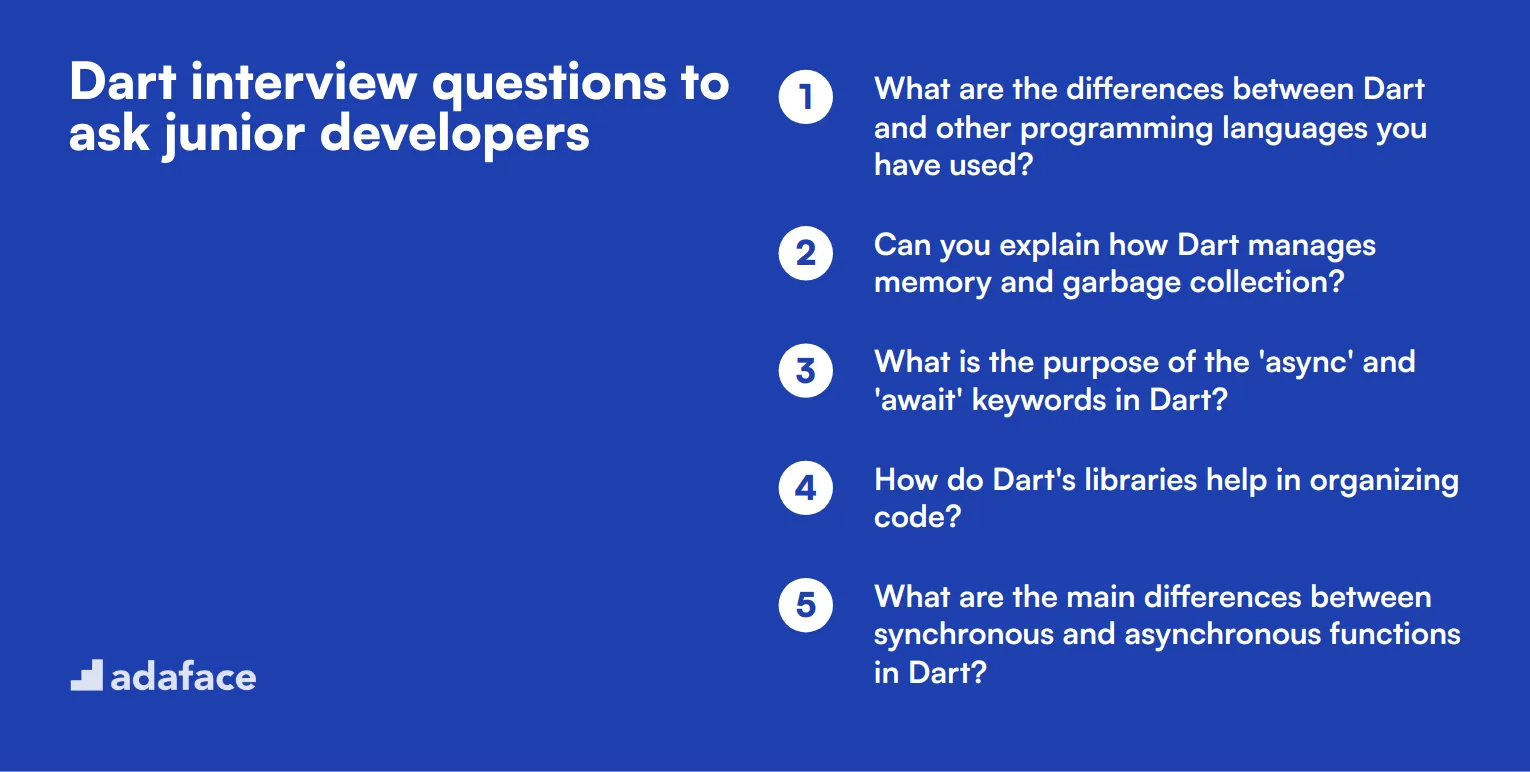
To effectively evaluate junior developers' understanding of Dart, ask them some of these focused interview questions. This list will help you gauge their foundational knowledge and practical skills, ensuring they are a good fit for your team. For a well-rounded assessment, consider reviewing relevant job descriptions as well.
- What are the differences between Dart and other programming languages you have used?
- Can you explain how Dart manages memory and garbage collection?
- What is the purpose of the 'async' and 'await' keywords in Dart?
- How do Dart's libraries help in organizing code?
- What are the main differences between synchronous and asynchronous functions in Dart?
- Can you describe the concept of 'extension methods' in Dart?
- How does Dart handle error handling and exceptions?
- What is a Future in Dart, and how does it differ from a Stream?
- How can you create a simple Flutter application using Dart?
- What are the advantages of using Dart for building web applications?
- Can you provide an example of how to use a Dart function as a callback?
- What is the significance of the 'pubspec.yaml' file in a Dart project?
- How do you optimize a Dart application for performance?
- What are some common Dart design patterns you are familiar with?
- How do you go about debugging a Dart application?
- What role does testing play in Dart development, and how do you implement it?
- Can you explain the use of the 'await for' syntax in Dart?
- What is the difference between a factory constructor and a normal constructor in Dart?
- How do you implement dependency injection in a Dart application?
- What tools do you use for Dart development and why?
- How do you handle state management in a Dart application?
9 advanced Dart interview questions and answers to evaluate senior developers
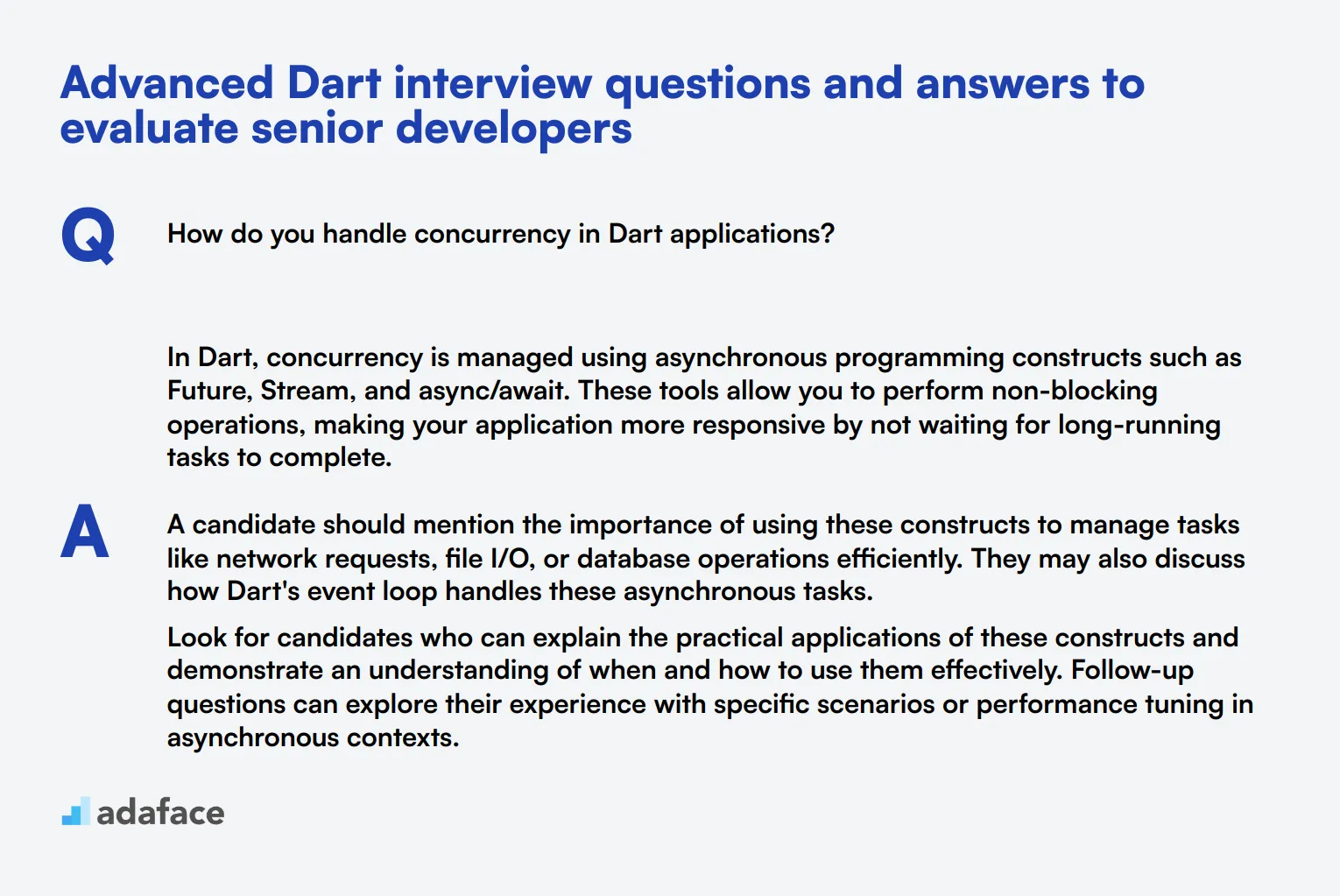
To evaluate the depth of your senior developers' knowledge in Dart, we've curated a list of advanced Dart interview questions. These questions will help you gauge their problem-solving abilities, experience, and understanding of Dart's intricacies, ensuring you find the right fit for your team.
1. How do you handle concurrency in Dart applications?
In Dart, concurrency is managed using asynchronous programming constructs such as Future, Stream, and async/await. These tools allow you to perform non-blocking operations, making your application more responsive by not waiting for long-running tasks to complete.
A candidate should mention the importance of using these constructs to manage tasks like network requests, file I/O, or database operations efficiently. They may also discuss how Dart's event loop handles these asynchronous tasks.
Look for candidates who can explain the practical applications of these constructs and demonstrate an understanding of when and how to use them effectively. Follow-up questions can explore their experience with specific scenarios or performance tuning in asynchronous contexts.
2. What strategies do you use for error handling in Dart?
Error handling in Dart is typically managed using try-catch blocks and custom exceptions. It's crucial to catch exceptions at appropriate levels and provide meaningful error messages to help diagnose issues.
Candidates might discuss their approach to logging errors, retry mechanisms, and how they ensure the application remains stable under unexpected conditions. They may also touch upon the use of finally blocks to execute code regardless of whether an exception was thrown or not.
Look for responses that demonstrate a proactive approach to error management, including strategies for preventing errors, handling known issues gracefully, and ensuring robust error reporting and logging mechanisms.
3. Can you explain how you would optimize the performance of a Dart application?
Optimizing a Dart application involves several strategies, such as minimizing the use of expensive operations, using efficient algorithms, and leveraging Dart's strong typing system to catch errors early.
Candidates might mention profiling tools like Dart DevTools to identify performance bottlenecks and memory leaks. They should discuss how to reduce unnecessary computations, optimize data structures, and manage resources effectively.
An ideal candidate will provide examples from past experiences where they successfully optimized an application. They should also articulate a clear understanding of performance metrics and how to measure improvements.
4. How do you ensure code maintainability and readability in Dart?
Ensuring code maintainability and readability in Dart involves following best practices such as consistent naming conventions, modular code design, and comprehensive documentation. Using meaningful variable names and comments can make the code easier to understand for others or even for your future self.
Candidates may also discuss the importance of code reviews and adhering to community standards and guidelines provided by Dart. They might touch on the use of static analysis tools and linters to enforce coding standards and catch potential issues early.
Look for candidates who emphasize collaboration and continuous improvement in code quality. Their answers should reflect a balance between writing efficient code and making it accessible and understandable to other developers.
5. What are some common challenges you have faced when working with Dart, and how did you overcome them?
Common challenges in Dart development may include managing state in large applications, dealing with platform-specific issues, or optimizing performance for different devices.
Candidates should discuss specific instances where they encountered these challenges and the approaches they took to resolve them. They might mention learning new frameworks, consulting documentation, or collaborating with peers to find solutions.
An ideal response will showcase the candidate's problem-solving skills, resilience, and ability to learn from experiences. It should also highlight their proactive approach to seeking out and implementing best practices.
6. How do you manage dependencies in a Dart project?
In Dart, dependencies are managed using the pubspec.yaml file, which allows you to specify the packages your project needs. You can add dependencies by listing them in the file and then using the Dart Pub package manager to install them.
Candidates might discuss best practices for managing dependencies, such as pinning package versions to avoid compatibility issues and regularly updating packages to benefit from the latest features and security fixes.
Look for responses that demonstrate a thorough understanding of dependency management, including how to handle conflicts and ensure that the project remains maintainable and up-to-date. Candidates should also be familiar with using private packages or creating custom packages when necessary.
7. What is your approach to testing in Dart?
Testing in Dart involves writing unit tests, integration tests, and, in the case of Flutter, widget tests. A comprehensive testing strategy ensures that your code is reliable and performs as expected under various conditions.
Candidates should discuss tools such as the Dart test package and the importance of writing testable code. They might also mention using continuous integration (CI) pipelines to automate testing and ensure that new changes don't introduce regressions.
An ideal candidate will emphasize the importance of a robust testing culture and provide examples of how they have implemented effective testing strategies in previous projects. They should also understand the balance between thorough testing and development efficiency.
8. Can you describe your experience with Dart's ecosystem and community resources?
Dart has a rich ecosystem with a variety of packages and libraries available through pub.dev. The community is active, with numerous resources such as forums, GitHub repositories, and official documentation.
Candidates should discuss how they leverage these resources to stay updated with the latest developments, resolve issues, and improve their skills. They might also mention contributions to the community, such as writing blog posts, creating packages, or participating in forums.
Look for candidates who demonstrate a strong connection with the Dart community and show a proactive approach to continuous learning and sharing knowledge. Their engagement can be a significant asset to your team's collective expertise.
9. How do you approach state management in Dart applications, especially when using Flutter?
State management in Dart, particularly with Flutter, can be handled in various ways, such as using the built-in setState method, provider package, Redux, or Bloc pattern. Each method has its use cases and trade-offs.
Candidates should explain their preferred approach and why they choose it. They might discuss the importance of separating business logic from UI code, making the application more scalable and maintainable. They should also highlight their experience with different state management solutions.
Look for responses that reflect a deep understanding of state management concepts and the ability to choose the right tool for the job. Their experience with different methods can provide insights into their problem-solving abilities and adaptability.
14 Dart interview questions about language syntax and semantics
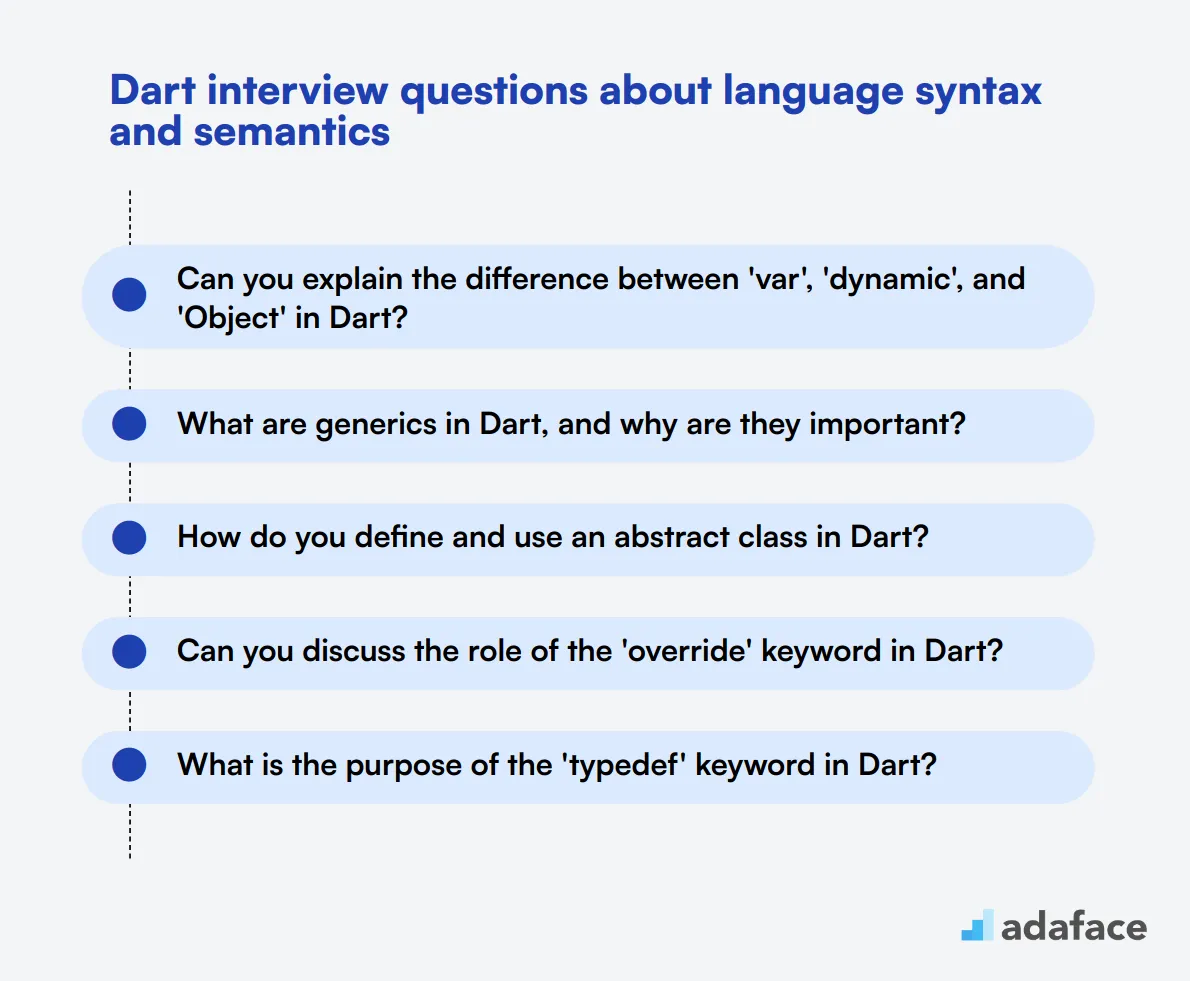
To assess whether your candidates possess a strong understanding of Dart's syntax and semantics, use this list of targeted interview questions. These questions are crafted to help you evaluate their technical knowledge effectively, ensuring they are well-equipped for roles like Flutter Developer.
- Can you explain the difference between 'var', 'dynamic', and 'Object' in Dart?
- What are generics in Dart, and why are they important?
- How do you define and use an abstract class in Dart?
- Can you discuss the role of the 'override' keyword in Dart?
- What is the purpose of the 'typedef' keyword in Dart?
- How do you create a singleton in Dart?
- Can you describe how the '??' operator works in Dart?
- What are the differences between a synchronous generator and an asynchronous generator in Dart?
- How can you implement a factory constructor in Dart?
- What are named parameters in Dart, and how do they differ from positional parameters?
- Can you explain the concept of 'first-class functions' in Dart?
- How do you create and use an enum in Dart?
- What is the significance of Dart's 'await' keyword when working with Futures?
- How do you create and manage a stream in Dart?
9 Dart interview questions and answers related to framework usage and libraries
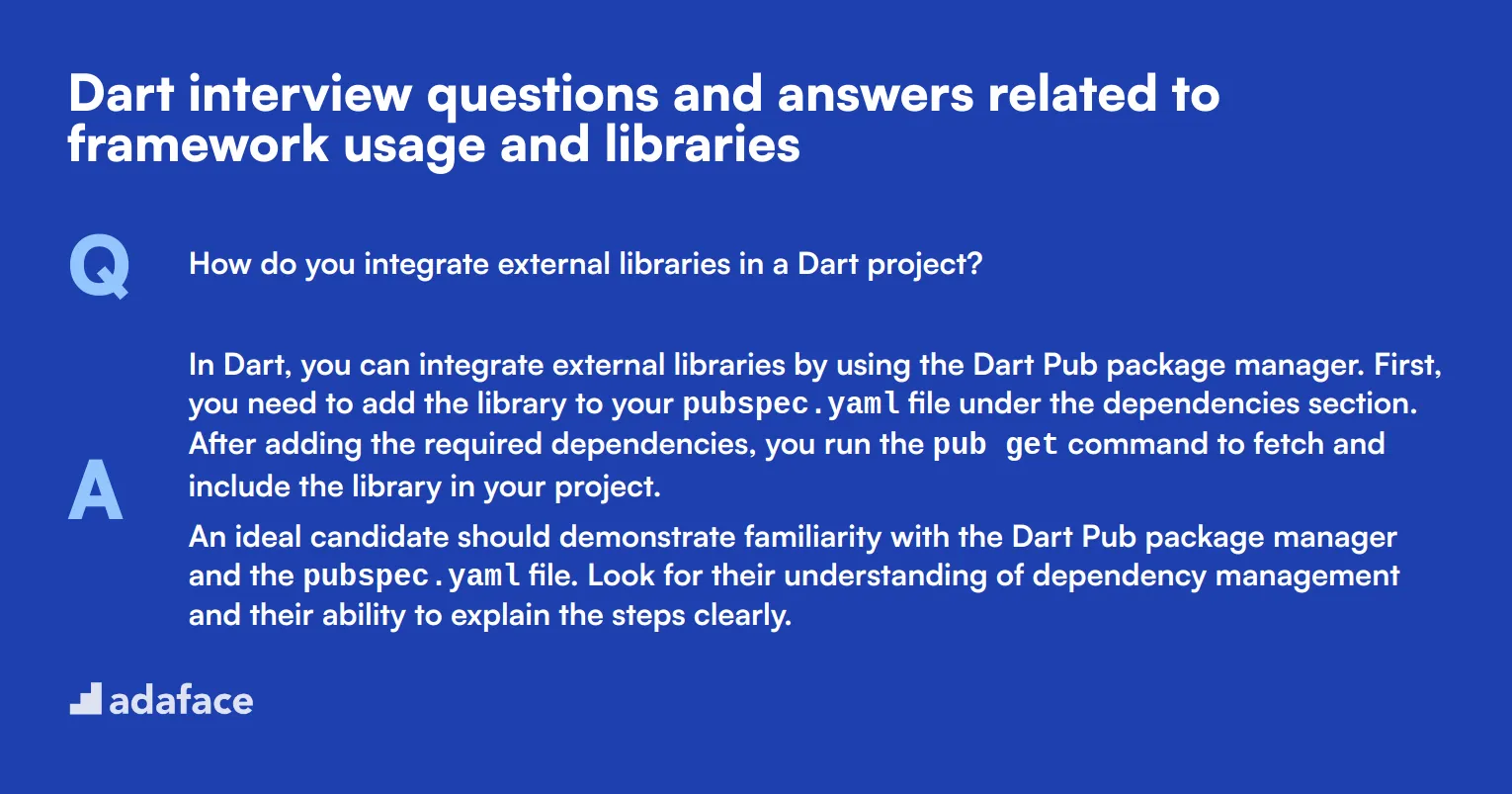
To evaluate whether your candidates can effectively utilize Dart frameworks and libraries, use these focused Dart interview questions. These questions are designed to gauge their practical understanding and ensure they have the right skill set for your development needs.
1. How do you integrate external libraries in a Dart project?
In Dart, you can integrate external libraries by using the Dart Pub package manager. First, you need to add the library to your pubspec.yaml file under the dependencies section. After adding the required dependencies, you run the pub get command to fetch and include the library in your project.
An ideal candidate should demonstrate familiarity with the Dart Pub package manager and the pubspec.yaml file. Look for their understanding of dependency management and their ability to explain the steps clearly.
2. Can you explain how to use the 'http' package for making network requests in Dart?
The 'http' package in Dart is widely used for making network requests. After adding it to your pubspec.yaml file and running pub get, you can import the package into your Dart file. The package provides methods like get, post, put, and delete to interact with RESTful APIs.
Strong candidates should be able to explain the general usage of the 'http' package and demonstrate an understanding of making asynchronous network requests. They should mention the importance of error handling and potential pitfalls like network latency.
3. How do you manage state in a Dart or Flutter application?
State management in Dart, especially with Flutter, can be handled in various ways. Basic state management can be done using StatefulWidgets, but for more complex applications, libraries like Provider, Riverpod, or Bloc are often used. These libraries help in managing state more efficiently and make the code more scalable and maintainable.
Look for candidates who understand the different state management solutions and can discuss the pros and cons of each method. They should be able to explain why they would choose one approach over another based on the application's requirements.
4. How important is testing in Dart, and what tools do you use for it?
Testing is crucial in Dart to ensure code reliability and functionality. Dart provides a built-in test package for writing unit tests, integration tests, and widget tests. Tools like flutter_test and mockito are often used to create comprehensive test suites and mock dependencies.
An ideal response should highlight the importance of testing in maintaining code quality. Candidates should discuss their experience with different types of tests and the tools they use, demonstrating their commitment to writing robust and error-free code. For more insights, you can check out this resource on testing.
5. What is the purpose of the Dart Pub package manager?
The Dart Pub package manager is used for managing Dart packages and libraries. It allows developers to easily include external packages in their projects, manage dependencies, and publish their own packages to the Dart community. The pubspec.yaml file is central to this process, where all dependencies are listed and managed.
Candidates should show a clear understanding of the Dart Pub package manager's role and its functionality. They should be able to explain how it simplifies dependency management and contributes to the Dart ecosystem.
6. How do you handle error handling in Dart applications?
Error handling in Dart is typically done using try-catch blocks. Dart supports synchronous and asynchronous error handling, allowing developers to catch and handle exceptions effectively. For network requests or asynchronous operations, the Future class and await keyword are commonly used.
Candidates should discuss their approach to error handling, emphasizing the importance of catching and managing errors to prevent application crashes. They should also mention best practices like logging errors and providing user-friendly error messages.
7. Can you explain how to use Dart's 'Stream' class for handling asynchronous data?
The Stream class in Dart is used for handling asynchronous data sequences. It is particularly useful for managing data that arrives over time, such as user inputs or data from external sources. Streams can be single-subscription or broadcast, depending on whether multiple listeners can subscribe to the same stream.
Ideal candidates should explain the basic concepts of streams, including listening to a stream, handling data events, and managing errors. They should also discuss practical scenarios where streams are beneficial, such as real-time data updates.
8. What is the role of the 'pubspec.yaml' file in a Dart project?
The pubspec.yaml file is a critical component of any Dart project. It contains metadata about the project, including its name, version, and dependencies. This file is used by the Dart Pub package manager to fetch and manage external libraries and packages.
An ideal candidate should be able to articulate the importance of the pubspec.yaml file and explain how to configure it for different project requirements. They should also highlight the significance of proper dependency management.
9. How do you optimize the performance of a Dart application?
Optimizing the performance of a Dart application involves several strategies, such as minimizing unnecessary object creation, using efficient data structures, and avoiding excessive computations. In Flutter applications, optimizing widget builds and using tools like the Flutter DevTools for performance profiling are crucial.
Candidates should discuss their approach to performance optimization, mentioning specific techniques and tools they use. They should demonstrate an understanding of common performance bottlenecks and how to address them effectively.
Which Dart skills should you evaluate during the interview phase?
While it’s impossible to gauge every aspect of a candidate's abilities in one interview, focusing on core Dart skills can greatly enhance your understanding of their proficiency. This section discusses the fundamental skills to evaluate when interviewing for a Dart position, ensuring you identify well-rounded candidates capable of thriving in your organization.
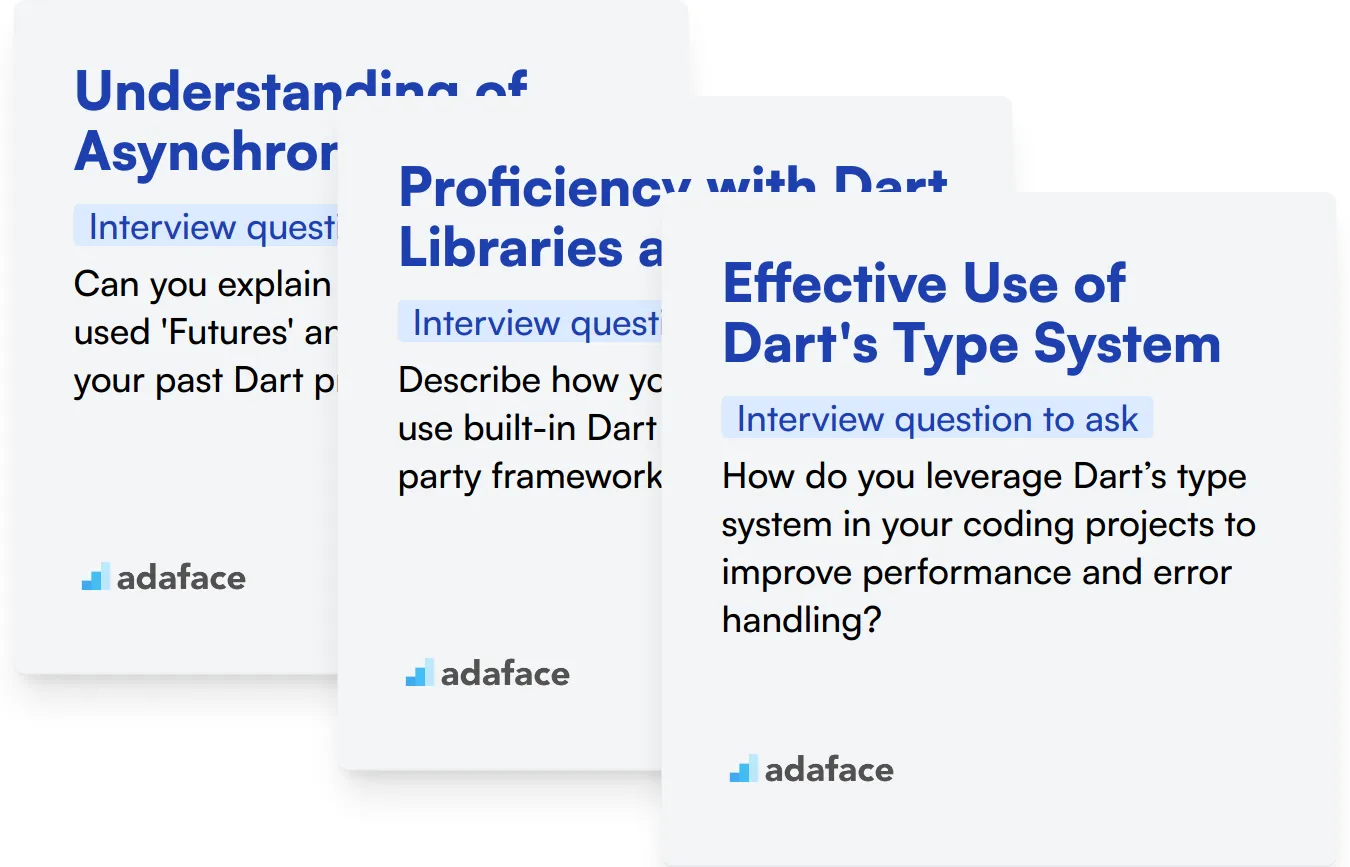
Understanding of Asynchronous Programming
Asynchronous programming is integral to Dart, especially for tasks that involve network operations, file I/O, or expensive computations. Mastery of this concept allows developers to write code that is efficient, maintainable, and scalable.
To assess candidates' grasp on asynchronous programming, consider using a Dart assessment test that includes multiple-choice questions on async-await, Futures, and Streams.
In addition to the assessment test, a targeted interview question can provide deeper insights into the candidate's practical application of asynchronous programming:
Can you explain how you have used 'Futures' and 'Streams' in your past Dart projects?
Look for answers that detail specific scenarios where they implemented these features to manage data, handle errors, or optimize performance. The depth of their experience and the complexity of the tasks tackled will be telling.
Proficiency with Dart Libraries and Frameworks
A strong understanding of Dart's standard libraries and popular frameworks, like Flutter, can be indicative of a candidate's ability to efficiently build complex applications. This skill is crucial for rapid development and ensuring high-quality software outputs.
To explore the candidate's expertise in Dart libraries and frameworks, here’s an insightful question to pose:
Describe how you decide when to use built-in Dart libraries or third-party frameworks in your projects.
Candidates should demonstrate a clear decision-making process that considers trade-offs like performance, maintainability, and project requirements. Their ability to justify their choices will reflect their depth of knowledge.
Effective Use of Dart's Type System
Dart's type system offers optional static types which are critical for building safe, scalable, and bug-free applications. Understanding and utilizing this system effectively can significantly enhance the software's reliability and performance.
To test the candidate's knowledge and use of Dart's type system, consider asking the following:
How do you leverage Dart’s type system in your coding projects to improve performance and error handling?
Look for answers that highlight their strategies for utilizing static and runtime checks, their approach to optimizing application performance, and examples from past projects where their use of type annotations led to fewer bugs or enhanced scalability.
Maximize Your Dart Interviews: 3 Pro Tips
Before you put your newfound knowledge to use, here are three valuable tips to enhance your Dart interview process. These strategies will help you make the most of your candidate evaluations.
1. Implement Skill Tests Before Interviews
Skill tests are an effective way to screen candidates before investing time in interviews. They provide objective data on a candidate's Dart proficiency and related skills.
For Dart developers, consider using a Dart online test to evaluate language fundamentals. If the role involves Flutter, a Flutter test can assess framework-specific skills.
These tests help you shortlist candidates with the required technical skills. By filtering out less qualified applicants, you can focus your interviews on the most promising candidates.
Implement these tests after initial resume screening but before scheduling interviews. This approach streamlines your hiring process and improves the quality of your interview pipeline.
2. Prepare a Balanced Set of Interview Questions
With limited interview time, it's crucial to ask the right questions. Prepare a mix of technical and behavioral questions to evaluate both Dart skills and cultural fit.
Consider including questions about related technologies like JavaScript or TypeScript. This helps assess the candidate's broader programming knowledge.
Don't forget to include questions about soft skills like problem-solving and communication. These are essential for any developer role and complement technical abilities.
3. Master the Art of Follow-up Questions
Asking follow-up questions is key to understanding a candidate's true depth of knowledge. It helps you distinguish between memorized answers and genuine understanding.
For example, after asking about Dart's async programming, follow up with a question about error handling in async functions. This probes the candidate's practical experience and problem-solving skills in real-world scenarios.
Use Dart interview questions and skills tests to hire talented developers
If you are looking to hire someone with Dart skills, it’s important to accurately ensure they possess those skills. The most efficient way to do this is through skill tests. Consider using our Dart online test to validate their expertise.
Once you use this test, you can effectively shortlist the best applicants and invite them for interviews. To get started, sign up at Adaface and explore our full range of assessments.
Dart Test
Download Dart interview questions template in multiple formats
Dart Interview Questions FAQs
The questions cover basic, junior, and senior developer skill levels, as well as language syntax and framework usage.
There are 20 Dart interview questions specifically tailored for junior developers.
Yes, the post includes 9 questions related to Dart framework usage and libraries.
The post provides pro tips on maximizing Dart interviews and suggests using skills tests alongside the questions.

40 min skill tests.
No trick questions.
Accurate shortlisting.
We make it easy for you to find the best candidates in your pipeline with a 40 min skills test.
Try for freeRelated posts
Free resources




